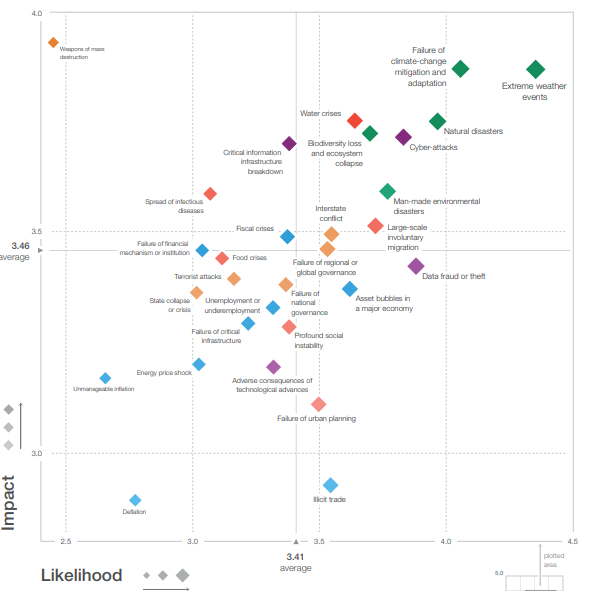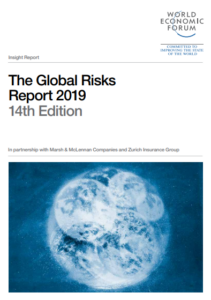The World Economic Forum published the “Global Risks Report 2019”, highlighting the top risks that we can expect in the future. In terms of likelihood, environmental and cyber issues complete the top five.
The report recognizes 5 categories of global risks:
- Economic;
- Environmental;
- Geopolitical;
- Societal;
- Technological.
Of these categories, environmental issues are most likely to happen, as 5 of them are making the top 10 risks. Risks such as cyber attacks and societal problems, add on the list, which includes:
- Extreme weather events;
- Failure of climate-change mitigation and adaptation;
- Natural disasters;
- Data fraud or theft;
- Cyber-attacks;
- Man-made environmental disasters;
- Large-scale involuntary migration;
- Biodiversity loss and ecosystem collapse;
- Water crises;
- Asset bubbles in a major economy.
These 10 items are the most likely to happen in the future. But what about the risks that will have the most impact. According to the report, these are:
- Weapons of mass destruction;
- Failure of climate-change mitigation and adaptation;
- Extreme weather events;
- Water crises;
- Natural disasters;
- Biodiversity loss and ecosystem collapse;
- Cyber-attacks;
- Critical information infrastructure breakdown;
- Man-made environmental disasters;
- Spread of infectious diseases.

What is more, the survey respondents said that they are worried about environmental policy failure, with ‘failure of climate-change mitigation and adaptation’ jumping back to number two, regarding impact. Namely, the increasing pace of biodiversity loss is a particular concern, with species abundance reducing by 60% since 1970.
[smlsubform prepend=”GET THE SAFETY4SEA IN YOUR INBOX!” showname=false emailtxt=”” emailholder=”Enter your email address” showsubmit=true submittxt=”Submit” jsthanks=false thankyou=”Thank you for subscribing to our mailing list”]
Additionally, rapidly growing cities, along with climate change are making more people vulnerable to rising sea levels. Namely, two-thirds of the global population is expected to live in cities by 2050 and already an estimated 800 million people live in more than 570 coastal cities vulnerable to a sea-level rise of 0.5 metres by 2050. However, there are three main strategies for dealing with rising sea-levels:
- Engineering projects to keep water out;
- Naturebased defences;
- People-based strategies, such as moving to safer ground or investing in social capital to make flood-risk communities more resilient.
As for technology, it will continue to play a key role in the global risks landscape. Concerns about data fraud and cyber-attacks are prominent again, highlighting various technological vulnerabilities. In fact, two-thirds of respondents expect the risks associated with fake news and identity theft to increase in 2019. What is more, data breaches in 2018, new hardware weaknesses , and research point to the potential uses of artificial intelligence to engineer stronger cyberattacks.
Another important issue are mental health problems, which affect 700 million people. These issues deserve more attention, as declining psychological and emotional wellbeing impacts social cohesion and politics.
See more about the future risks in the following PDF


































































